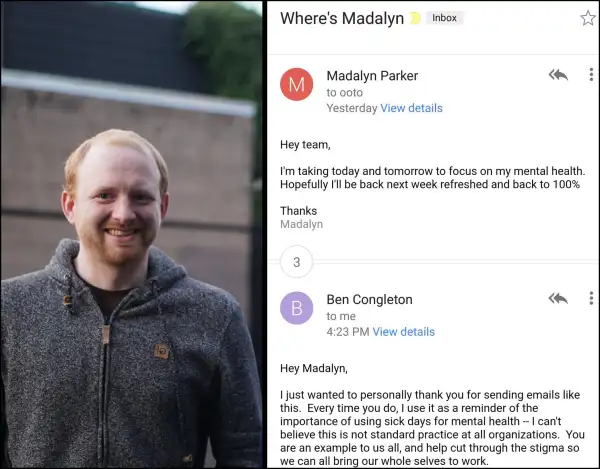Meet the CEO Whose Comments About Mental Health in the Workplace Went Viral

Madalyn Parker, a web developer at Olark Live Chat in Ann Arbor, Mich., recently emailed her colleagues to let them know she would be using two sick days to focus on her mental health.
When the CEO of the company, Ben Congleton, responded by thanking her for helping "cut through the stigma" of mental health, she shared his response on Twitter. And then it went viral.
When the CEO responds to your out of the office email about taking sick leave for mental health and reaffirms your decision. 💯 pic.twitter.com/6BvJVCJJFq
— madalyn (@madalynrose) June 30, 2017
//platform.twitter.com/widgets.js
The tweet, which has been retweeted more than 10,800 times since it was posted on June 30, has sparked discussions about the importance of understanding mental health in the workplace — and how using sick days to treat it can be helpful.
In an interview with Money, Congleton, whose business provides live chat software to other companies to better interact with their costumers, said he was surprised by the reactions to Parker's tweet — mostly because valuing the mental health of his employees is just business as usual for him.
"I sort of felt like this was just something that should be normal," Congleton said. "It's just business as usual for us. This is not something new."
In some responses to Parker's tweet, Twitter users shared negative reactions to their requests for a mental health day including one where a woman said she left a job after "HR wanted to know in advance when I'd have a panic attack."
"Mental health is health," Parker wrote in response to a reply to her original tweet.
Congleton said Parker strongly advocates for mental health awareness within the company. In fact, she and several other colleagues shared their experiences and challenges with mental health in a joint session with the organization a few years ago — setting the tone for openness within the company.
"We built this organization with this culture of where this kind of talk is no big deal," Congleton said. "I think that that started normalizing mental health as an actual health issue within our organization."
"So many people live in fear of disclosing mental health issues at work," he added. "In many ways, that fear makes those mental health issues worse."
For Congleton, it is important for a company to build a safe space for its employees, where they can feel vulnerable and are willing to share any issues they may be having, whether that's related to mental health or not. He often tries to find ways to show his gratitude for his employees — and his message to Parker was one of those efforts.
Mental illness is common among American adults, with one in five experiencing depression, anxiety or some other kind of mental or emotional disorder. The American Psychiatric Association provides materials for companies to understand mental health in the workplace, ranging from detailing how anxiety disorders are "not a sign of personal weakness" to reporting how 80% of employees treated for mental illness showed improved levels of work efficency.
This is not the first time Parker has written about her life in the workplace as she copes with anxiety and depression. In a 2015 blog post, she detailed how she worried her mental health would impact her job performance — and how she decided to talk to Matt Pizzimenti, one of the early founders of the company, about it.
"Matt didn’t mention my performance at all," she wrote. "The conversation was quickly focused on my well-being and health, and the team’s willingness to work with me during my low points."
Parker did not respond immediately to a request for an interview from Money.
Mental health disorders take a toll beyond the workplace environment, too. A recent Money investigation examined the extreme costs of coping with a mental or emotional disorder.
As for other companies, Congleton has some advice to help them empower those dealing with mental illness, or who just need a few days to recharge.
"I'm hoping that we can have a few more leaders, a few more managers step up and really have conversations about how to build environments where their employees feel psychological safety," Congleton said. "From that you can get so much amazing goodness and so much performance that the teams that will have that will be the strongest ones in your organization."